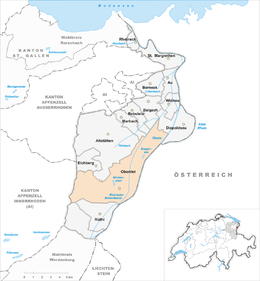Oberriet
| Oberriet | ||
|---|---|---|
 |
||
|
||
| Coordinates: 47°19′N 9°34′E / 47.317°N 9.567°ECoordinates: 47°19′N 9°34′E / 47.317°N 9.567°E | ||
| Country | Switzerland | |
| Canton | St. Gallen | |
| District | Rheintal | |
| Government | ||
| • Mayor | Walter Hess | |
| Area | ||
| • Total | 34.53 km2 (13.33 sq mi) | |
| Elevation | 420 m (1,380 ft) | |
| Population (Dec 2015) | ||
| • Total | 8,719 | |
| • Density | 250/km2 (650/sq mi) | |
| Postal code | 9463 | |
| SFOS number | 3254 | |
| Surrounded by | Altach (AT-8), Altstätten, Balgach, Diepoldsau, Eichberg, Koblach (AT-8), Mäder (AT-8), Marbach, Meiningen (AT-8), Rebstein, Rüte (AI), Rüthi | |
| Website |
www SFSO statistics |
|
Oberriet is a municipality in the Wahlkreis (constituency) of Rheintal in the canton of St. Gallen in Switzerland.
Oberriet is first mentioned in 891 as Cobolo. About 1290 it was mentioned as Chobilwalt and in 1417 it was first mentioned as Oberriet.
Oberriet has an area, as of 2006[update], of 34.5 km2 (13.3 sq mi). Of this area, 57.2% is used for agricultural purposes, while 25.9% is forested. Of the rest of the land, 12.9% is settled (buildings or roads) and the remainder (4.1%) is non-productive (rivers or lakes).
The municipality is located in the Rheintal Wahlkreis. It consists of the villages of Oberriet, Eichenwies, Montlingen and Kriessern in the Rhine valley, as well as Holzrhode in the Kamor hills and the village of Kobelwald and the hamlets of Freienbach, Kobelwies and Hard. It also includes the former Imperial palace (Kaiserpfalz) at Kriessern, but not the formerly attached village of Mäder in Vorarlberg and Diepoldsau. It lies between Rüthi in the south and Eichberg in the northwest.
The blazon of the municipal coat of arms is Per fess Or a Lion passant Sable langued and armed of the field and Sable a Cross pattee couped between in chief two Mullets Or.
Oberriet has a population (as of 31 December 2015) of 8,719. As of 2007[update], about 11.5% of the population was made up of foreign nationals. Of the foreign population, (as of 2000[update]), 54 are from Germany, 63 are from Italy, 461 are from ex-Yugoslavia, 115 are from Austria, 3 are from Turkey, and 88 are from another country. Over the last 10 years the population has grown at a rate of 7.3%. Most of the population (as of 2000[update]) speaks German (94.2%), with Albanian being second most common ( 3.0%) and Serbo-Croatian being third ( 0.8%). Of the Swiss national languages (as of 2000[update]), 7,019 speak German, 8 people speak French, 41 people speak Italian, and 5 people speak Romansh.
...
Wikipedia



